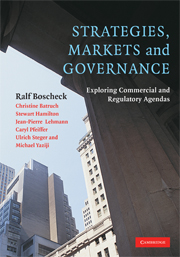Book contents
- Frontmatter
- Contents
- List of Figures, Boxes and Tables
- Acknowledgments
- Preface
- Notes on Contributors
- Part I Introduction and overview
- Part II Firm-level
- Part III Industry-level
- Part IV Country/International level
- 13 Governing oil supply: Fiscal regimes, NOCs and the steering of resource-based economies
- 14 China – External imperatives and internal reforms
- 15 EU constitutional governance: Failure as opportunity!?
- 16 One competition standard to regulate global trade and protection?
- Part V An observation in closing
- Index
14 - China – External imperatives and internal reforms
Published online by Cambridge University Press: 06 July 2010
- Frontmatter
- Contents
- List of Figures, Boxes and Tables
- Acknowledgments
- Preface
- Notes on Contributors
- Part I Introduction and overview
- Part II Firm-level
- Part III Industry-level
- Part IV Country/International level
- 13 Governing oil supply: Fiscal regimes, NOCs and the steering of resource-based economies
- 14 China – External imperatives and internal reforms
- 15 EU constitutional governance: Failure as opportunity!?
- 16 One competition standard to regulate global trade and protection?
- Part V An observation in closing
- Index
Summary
China and reform in the global era
Supachai Panitchpakdi, formerly Director General of the WTO and now Secretary General of UNCTAD, and Mark Clifford, Editor of the South China Morning Post and long-time Greater China observer, set the tone for the implications of China's resurgent entry into the global political and economic environment in a book published at the dawn of this century.
Whether it's looking out over the next few years or the next quarter-century, how the world's most populous country handles the many developmental challenges it faces will go a long way toward determining what kind of world we inhabit. Pick an issue – the environment, the military, international affairs or the global economy – China's choices will have a major impact on Asia and the world. If China makes the wrong decisions, the result will be chilling, not only for the country's 1.3 billion citizens but for many people beyond its borders as well. Conversely, a China that successfully makes the transformation to a relatively affluent, open society will be both an inspiration to other countries and a locomotive that will help to power the world's economies.
The decisions of course are not just China's to make. Much also depends on how the rest of the world, and especially the US, reacts to China's apparently inexorable ascendancy. We have seen often in the past century the coming and going of potential new “great powers” that turned out to be mirages.
- Type
- Chapter
- Information
- Strategies, Markets and GovernanceExploring Commercial and Regulatory Agendas, pp. 259 - 276Publisher: Cambridge University PressPrint publication year: 2008

